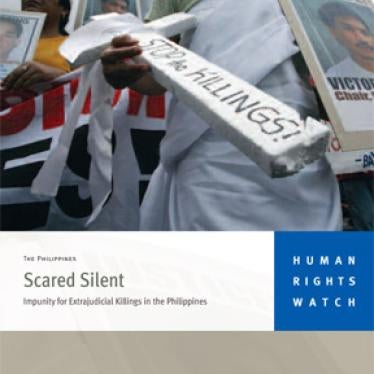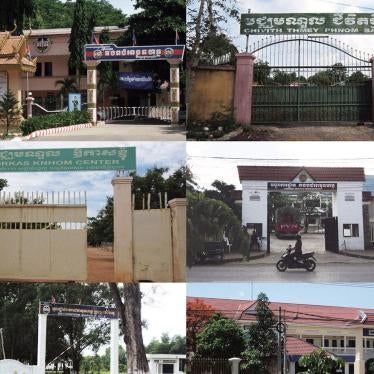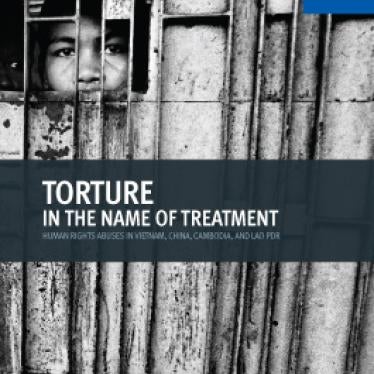(New York) - The Philippine government should investigate retired Major General Jovito Palparan for widespread rights violations by forces under his command instead of appointing him to a senior state post, Human Rights Watch said today.
According to news reports, Philippine Executive Secretary Eduardo Ermita recently told reporters that Palparan was being considered for a post on the Dangerous Drug Board. Its chairman, Vicente Sotto III, quickly welcomed the announcement, saying Palparan would be an "asset" to the agency.
A 2006 government commission investigating extrajudicial killings of journalists, leftist activists, and outspoken clergy implicated members of the military and identified Palparan in its report as the "prime suspect behind the extrajudicial killings" in the Philippines.
"Considering the serious abuses committed under his command, Palparan and his legacy would be a liability, not an asset, to any government institution that cares about its reputation for upholding human rights," said Elaine Pearson, deputy Asia director at Human Rights Watch.
The Dangerous Drug Board is a government body in charge of formulating policies and strategies on drug prevention and control. It is composed of top officials from various departments, including justice, health, local government, and foreign affairs, plus the National Bureau of Investigation and the Philippine National Police.
Ermita reportedly said at a press briefing that "If he [Palparan] was able to generate good information and intelligence from among the NPA [New People's Army], I think he can also do the same thing among drug traffickers and drug pushers." The NPA is the armed wing of the Communist Party of the Philippines. It has been engaged in an armed rebellion against the government since 1969.
"Appointing Palparan to a senior state post would send a strong message that the government rewards, not punishes, those who encourage the killing of perceived adversaries," said Pearson. "Unless the Philippines wants a dirty ‘war on drugs' riddled with killings, it should not take such a dangerous move."
The Melo Commission, which President Gloria Macapagal Arroyo created in 2006 to investigate extrajudicial killings in the Philippines, concluded that, "There is certainly evidence pointing the finger of suspicion at some elements and personalities in the armed forces, in particular General Palparan, as responsible for an undetermined number of killings, by allowing, tolerating, and even encouraging the killings."
Human Rights Watch has repeatedly called on the Philippine government to investigate Palparan and other former and current high-ranking military officers for the extrajudicial killings and other gross human rights violations committed under their command.
Background
Since 2001, hundreds of members of left-wing political parties, human rights activists, journalists, and outspoken clergy have been killed or abducted in the Philippines. The number of such killings increased sharply after President Arroyo's June 2006 declaration of an "all-out war" against the NPA.
The number of killings dropped sharply in 2007-2008 after much condemnation by human rights groups and international pressure. However, extrajudicial killings have continued, and most of the perpetrators of the killings still enjoy impunity. The number of soldiers convicted for involvement in extrajudicial killings committed since Arroyo took office in 2001 remains zero.
Palparan, military commander for Central Luzon until September 2006, denies allegations from local human rights organizations that political killings escalated wherever he was in charge of counterinsurgency efforts, but he has also made numerous pronouncements attempting to justify such killings.
In June 2006, while still in command, Palparan told journalists that the killings were "being attributed to me, but I did not kill them. I just inspired [the triggermen]. We are not admitting responsibility here, what I'm saying is that these are necessary incidents."
Palparan alleged that the rebel network includes many legal nongovernmental organizations infiltrated or directed by the Communist Party of the Philippines, which provides materials and shelter for the NPA, saying such organizations are "legal but they're doing illegal activities." He also said about leftist political party leaders, "Even though they're in government, no matter what appearance they take, they are still enemies of the state."
Palparan warned that an effective counterinsurgency campaign will be messy, saying: "There will be some ... collateral damage, but it will be short and tolerable, [and in the end] acceptable. The enemy would blow it up as a massive violation of human rights, but to me it would just be necessary incidents compared to what will happen really if we do not decisively confront the problem."
Palparan reportedly told the Melo Commission investigating the killings that if his men kill civilians suspected of NPA connections, "it is their call [about whether to do so]." The commission said that: "under the doctrine of command responsibility, General Palparan admitted his guilt of the said crimes. Worse, he admittedly offers encouragement and ‘inspiration' to those who may have been responsible for the killings."
Accordingly, the commission concluded that Palparan "may be held responsible for failing to prevent, punish, or condemn the killings under the principle of command responsibility."
The Philippine government claims to have taken many measures to address extrajudicial killings, including the establishment of various taskforces and commissions. But to date, it has failed to take any meaningful steps to properly investigate Palparan's responsibility for extrajudicial killings and other human rights violations committed by soldiers under his command.
Human Rights Watch documented such abuses in its June 2007 report, "Scared Silent: Impunity for Extrajudicial Killings in the Philippines" (https://www.hrw.org/en/reports/2007/06/27/scared-silent-0 ).







